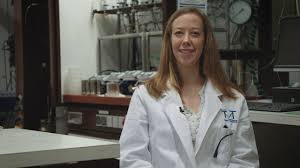
Source: Chemie Cluster Bayern
Our Co-Founder and CTO was in the hot seat of the chemie cluster Bayern to answer three questions about Lignopure and its solutions. Here they are:
Ms. Reynolds, how did the idea for the founding of Lignopure arise and what exactly is your startup doing?
When using, for example, straw or wood in the production of pulp, chemicals or bioethanol, lignin always occurs as a side stream. Along with cellulose, lignin is one of the main components of woody biomass and the second most abundant biopolymer in the world. However, lignin has hardly been used in high-quality products to date, instead it has mostly been burned to provide energy. That is a shame, because lignin has many fascinating properties that can also be used in a targeted manner in products that we use daily, for example, in the life science sector and innovative materials. This is exactly what Lignopure wants to achieve by producing tailor-made lignin particles for cosmetic applications as well as individual technological development services.
What are the possible uses for your products, and what are the advantages?
Lignin is a plant-based, and therefore vegan, raw material which is already extracted primarily in pulp mills or biorefineries and could thus be used industrially. In addition, lignin does not compete with food, which is a crucial advantage in comparison to existing bio-based solutions. What distinguishes lignin above all is its functionality!
In the plant cell, lignin acts as an antioxidant and as a UV protector, but also, for example, as a mechanical reinforcement in the form of filler material. It is our goal to introduce these functionalities into innovative products based on the raw material lignin, which can replace fossil solutions in our everyday lives. In composite materials it can be used, for example, for flame and aging protection, and in cosmetics as a UV filter or surfactant. Of course, not all lignin is the same, the various starting biomass and digestion processes as well as the processing of the material have a decisive influence on the final properties. And this is exactly where our expertise lies.
This means that lignin is much more than a pure bio-filler for optimizing the ecological footprint of a material, which does not mean that lignin cannot have a positive influence on, CO2 emissions, for instance, even in comparison to other bio-based solutions.
What challenges do you and your team face?
As a B2B startup, Lignopure, with its business model, functions as a liason between two processing fields – the pulp / biorefinery industry and the processing companies that want to bring innovative lignin-based products onto the market for the first time. Of course, this involves the development of completely new material paths and sometimes the creative use of established processes for new approaches – a path that is not always easy. You definitely have to show passion for the idea of using lignin in really high-quality products. But it is absolutely worth the effort!
Another obstacle to using lignin can be its characteristic brown color. However, this is changing more and more as consumers become more aware of sustainable solutions and new design ideas for ecological products. And for a number of products, this natural shade is even an advantage.
Source and complete article:
https://chemiecluster-bayern.de/en/news/hot-seat-dr-ing-wienke-reynolds/

